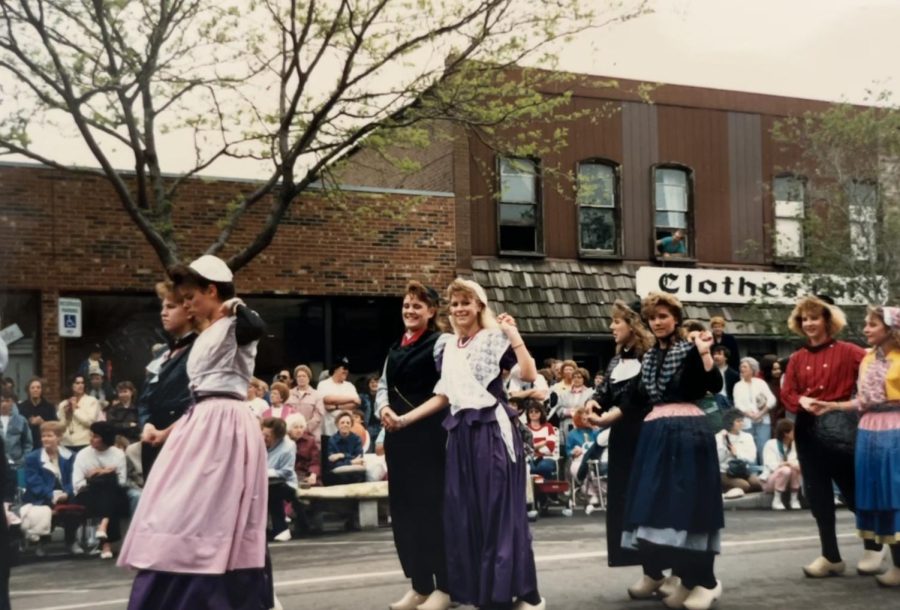When did Tulip Time lose the hype?
May 8, 2023
Clop, clop, clip clop, clop…
Wooden shoes echo through 8th Street as the Dutch Dancers begin the 94th annual Tulip Time festival in the heart of Holland.
For residents, this tradition is widely known. Eight days of music, marching, klompen dancing, venues, and of course–tulips. Hundreds of thousands of tulips are purchased and planted every year to continue this famous Dutch tradition.
Since the early thirties, the traditions have been kept alive, flourishing along with the tulips, but the culture and respect that comes with it has died off almost entirely with local students.
Holland area schools–West Ottawa, Holland High, Holland Christian, Black River, and Zeeland–all send groups of their students to participate in the festival. Elementary school through high school each have different roles, from marching, to playing instruments in the bands.
West Ottawa alumni, Aimee Dejong, participated in Tulip Time from when she was five to when she was in college.
“When I was five years old I was on the float for being a twin, and every year we would do that until I got old enough to walk through the parade. Sixth grade, seventh grade, eighth grade, ninth, tenth I was in band, and then eleventh and twelfth, I dutch danced. And then, years after that, I drove the governors in the convertibles,” Dejong said.
Since the 80s (Dejong’s school days), the parade itself has only grown in size, keeping almost all of the same traditions. Apart from more food venues and the carnival (which has only started within recent years), Tulip Time is the same now as it was for Dejong during her childhood.
However, one key aspect has noticeably changed. The respect and participation in celebration for the culture has declined.
“It was really neat being a Dutch Dancer because people came from all over to see you dance and perform and you really realized how many people really loved Dutch culture. I mean, they would come from West Virginia and it was like… growing up here you didn’t really think it was that great, but when people are coming from California to see the dutch dancers, it’s pretty cool. You realize pretty fast that this is important. This is our heritage,” Dejong said.
But as decades pass, this respect has faded with the involvement.
Dutch dance itself is a prime example. In the 80s, Dutch Dance was “the thing.” It was considered a sport; people would quit spring sports in order to be involved, and almost everyone was involved in some way. There were relatively a hundred dancers every year just through West Ottawa. Now, the club is down to fewer than fifteen.
Tulip Time has flourished into being considered a day off from school. A day to hang out with friends and have fun.
Some go to the parade, walk around a bit, get food, and leave. Some go to the carnival (an event hardly in relation to the actual celebration). And some don’t even go at all.
For many students, the last time they sat and watched the parade or did something to actually celebrate the culture, they were in elementary school.
“I feel like teens don’t care because there is more going on besides the parade, such as the carnival, where they can have fun on rides instead of sitting in the hot sun. But they should still appreciate the event, especially knowing that, living in Holland, your peers are partaking in the event and working long hard hours to perfect their part in it,” said Jr. Emma Defries.
In a survey of high school students, only 52% of people said they actually watch the parade. Those who don’t, added in comments such as, “Mainly there for food and to socialize” and “I just go for the crowd.”
How did people forget the real meaning behind the celebration?
A part of the issue is new cultures have come to Holland who weren’t here in the 80s.
“Everyone was Dutch. All my friends were Dutch. Our parents would marry into Dutch families in order to have Dutch kids. Last names mattered,” Dejong said.
According to the Holland Census Bureau, Dejong was right: during this time period, the city was almost 90% of Dutch heritage, whereas now, it reaches barely 28%.
Largely, the change in perspective is due to the changing demographics in the Holland community.
As Holland welcomes new heritages with open arms, it’s wise to remember that culture can be celebrated by anyone and is not limited to only those of Dutch descent.
People don’t have to be Dutch in order to watch the parade, learn about the origins of the tulips, or participate in activities such as Dutch Dance.
And for the Dutch students reading this, take pride in your heritage and appreciate growing up in a place where culture and tradition is celebrated just as your ancestors have done.





